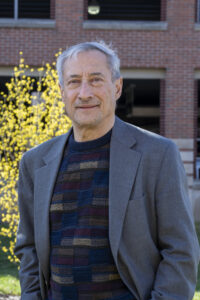Inducted 2024

Eric Freedman
chair/professor, Knight Center for Environmental Journalism/Michigan State University
Eric Freedman soon realized that the reporters he met as a legislative aide to New York Congressman Charles Rangel had far more fun than the lawyers he knew.
So, in 1975, armed with a newly-minted New York University law degree and no journalism experience other an undergraduate magazine writing class, he applied for jobs in both fields.
Luckily an editor at the Knickerbocker News in Albany, New York, sought a reporter who was a lawyer. Freedman took the job.
“I figured if I didn’t like it, I could always practice law,” he said.
But he liked it.
He first covered courts and then city hall. A favorite story he broke was of a brothel in a city-owned building and that operated under police protection. “The madam’s name was Trixie,” he recalled with a reporter’s attention to detail.
Then for five years he covered New York politics and the state capital, once traversing the state to report on tiny communities receiving disproportionately large federal subsidies.
“It gave me a chance to meet real people,” he said. “And in some ways, it was data journalism.”
In 1984 he moved to the Detroit News to join a major expansion of that paper’s state bureau in Lansing. He reported on courts, state government, politics, public affairs, historical and environmental preservation. He once wore snowshoes to report on state conservation officials tagging moose calves in deep snow.
And he helped uncover a financial scandal that led to 10 convictions, including the director of the House Fiscal Agency and a member of the state House of Representatives, the removal of the powerful chair of the House Appropriations Committee and the enactment of new oversight measures.
That story resulted in the 1994 Pulitzer Prize in beat reporting, an accomplishment he modestly refers to as “solid journalism work.” After winning a dozen major professional awards, he turned to teaching, coming to the Michigan State University School of Journalism first as an adjunct instructor in 1996 and eventually as a full professor. Today he is the school’s director of the Knight Center for Environmental Journalism and of Capital News Service. He is an international expert on press freedoms and has been awarded a dozen major academic awards, including three Fulbright Scholar Awards. He has mentored hundreds of students.
He still reports and writes. And has as much fun as he once anticipated.
“I’ve probably had more fun,” he said. “Journalism has got its moments. It has its economic uncertainties. But the reporting part I still enjoy.”
